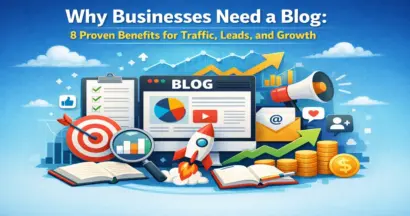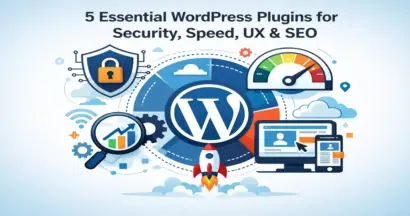Are you looking for the best alternatives to WordPress?
WordPress has its advantages, but there are other great options out there that offer similar features like website design, blogging tools, and online stores – all in one easy-to-use package.
These platforms handle technical details like updates and security for you, and they’re usually easier to learn than WordPress, so you can get your website up and running quickly.
In this guide, we’ll dive into the best WordPress alternatives, exploring the top ones. We’ll examine their unique features, pros, and cons to help you find the perfect platform for you!
Eduma – Education WordPress Theme
We provide an amazing WordPress theme with fast and responsive designs. Let’s find out!
Why Explore Alternatives to WordPress?
WordPress is a popular choice for building websites, but it might not be the best fit for everyone.
Here’s why you might want to consider other options:
- Overwhelming choices: WordPress offers countless WordPress themes and plugins, and settings, which can make it hard to decide where to start and slow down your progress.
- Hidden costs: Besides the WordPress software itself, you’ll also need to pay for a domain name and web hosting, and potentially premium themes or plugins. These costs can add up quickly.
- Too complex: WordPress is a powerful tool, but it might be overkill for simple websites or projects where you need to get something up and running quickly.
If these sound like your concerns, don’t worry! There are many other website builders and platforms available that offer simpler, more affordable, and faster solutions for creating your website.
How To Choose The Best WordPress Alternatives?
Choosing the best WordPress alternative depends on several factors:
- Website type and size: Consider the purpose and scale of your website.
- Ease of use: Evaluate the learning curve and user-friendliness of the site editor.
- Template library: Choose a builder with templates that match your design preferences.
- Additional features: Check for multilingual options, security, storage, hosting speed, and pricing.
Finding the right builder involves exploring different platforms and comparing their features to find the one that best suits your needs and comfort level.
Best WordPress Alternatives & Competitors
Shopify

Shopify is a top eCommerce platform built for online stores. It offers a user-friendly experience, taking care of hosting and maintenance so you can focus on running your business.
Key Features:
- Designed specifically for eCommerce and mixed commerce businesses (includes brick and mortar features)
- Hosted platform with support and maintenance included
- Customizable with free and paid themes and apps
Ideal For:
- First-time eCommerce store owners
- Businesses focused solely on online retail
Pricing:
- Starts at $39 per month + transaction fees
Squarespace

Squarespace is an all-in-one website-building platform that offers a user-friendly experience with a wide range of features, making it ideal for individuals and small businesses who value design and convenience.
Key Features:
- Domain, hosting, and design in one package
- Over 100 professionally designed templates
- Built-in SEO and marketing tools
- Simplified website building process
Ideal for:
- Individuals and small businesses who prioritize design and simplicity and want to manage their website needs in one place.
Pricing:
- Starting at $23 per month
Wix
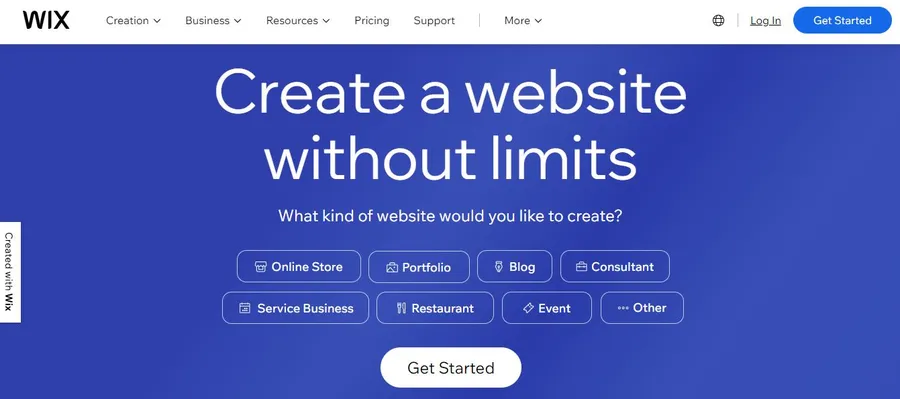
Wix is a popular website builder that stands out for its user-friendly interface and extensive design capabilities.
It is ideal for users without coding experience who want to quickly create visually appealing websites. The platform’s drag-and-drop customization feature is a significant advantage, allowing users to easily tailor their sites to their specific needs.
However, Wix has some drawbacks. The platform is known for its numerous upsells and features that are locked behind paywalls. Additionally, the emphasis on design can sometimes make it challenging to create fully accessible and responsive websites.
Key Features:
- Fully hosted with no coding required
- Vast collection of templates
- Intuitive drag-and-drop customization
Ideal For:
- Small business owners and individuals seeking a simple way to create a web presence
- Users prioritizing design over advanced customization
- Those who prefer a user-friendly platform with a minimal learning curve
Pricing:
- Starts at $16/month
Weebly
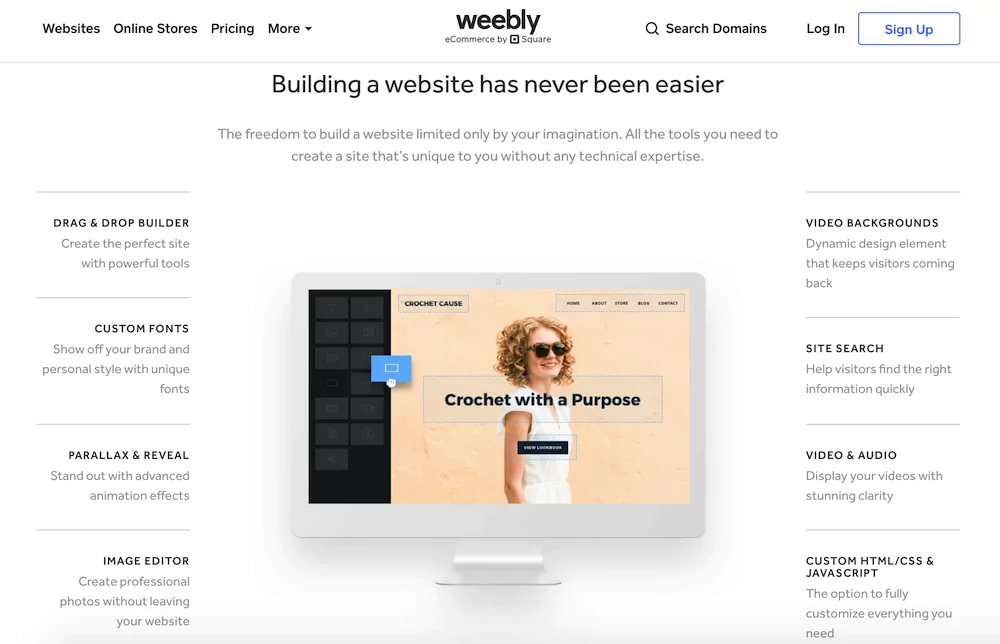
Weebly, acquired by Square, has transformed into a user-friendly eCommerce platform. While maintaining its intuitive design, Weebly now prioritizes online sales tools.
Key Features:
- Drag-and-drop interface for easy website building
- Built-in eCommerce tools, even for free accounts
- Pre-designed themes for quick site setup
- Abandoned cart recovery feature (unlike other platforms where this is often an add-on)
Ideal For:
- Small businesses seeking to establish an online store quickly. Weebly is perfect for those who prioritize sales over extensive content creation.
Pricing:
- Free plans available with paid options starting at $13 per month.
Webflow
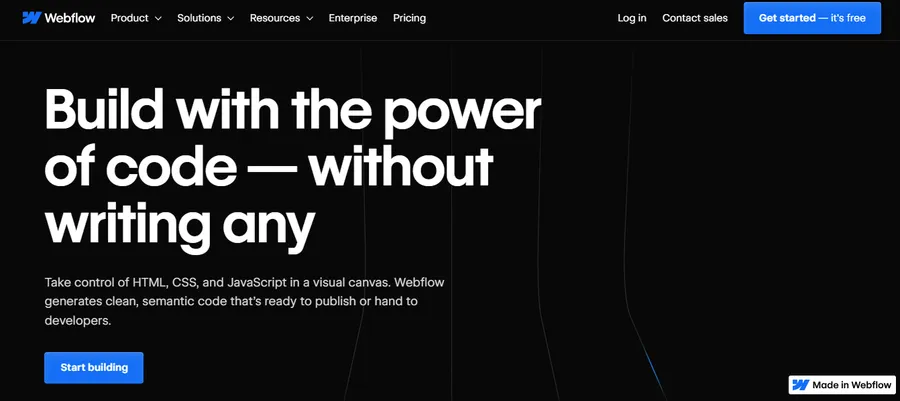
Webflow is a comprehensive website builder that empowers users to create professional-looking websites without coding or extensive technical knowledge.
It stands out for its visual site builder and custom CMS capabilities, making it a strong contender for those seeking an all-in-one solution.
Key Features:
- Beginner-friendly visual site builder with advanced CSS-like customization options
- Custom CMS for creating flexible content systems
- Seamless Figma integration for rapid prototyping and publishing
- All-in-one platform with built-in SEO, security, and eCommerce tools
Ideal For:
- Individuals and small businesses seeking a high-quality design experience.
- Those who prefer managing their entire online presence from a single platform.
Pricing:
- Free plan for building test sites.
- Paid plans start at $18 per month.
Drupal
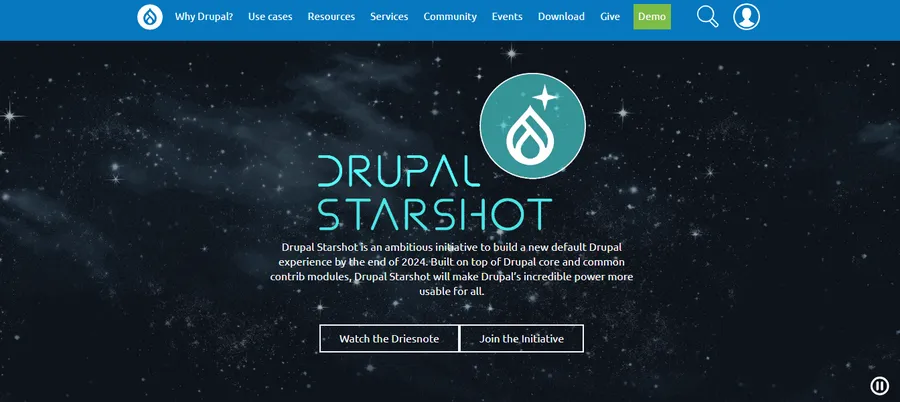
Drupal is an open-source content management system (CMS) that offers a high degree of customization and scalability, making it a great option for complex websites and businesses that prioritize security.
Key Features:
- Extensive library of modules (similar to WordPress plugins) and themes for extending functionality and appearance
- Highly scalable for complex content structures and large websites
- Strong emphasis on security, with regular updates driven by a dedicated community
Ideal For:
- Users with some web design experience who are comfortable with a more technical platform
- Businesses that need a complex, scalable website with robust security features
Pricing:
- Drupal itself is free and open-source, but there are associated costs for hosting, domain registration, and development if you don’t have the technical skills to do it yourself.
What is the Best WordPress Alternative?
Although WordPress is a fantastic option for building websites, there are other excellent alternatives available to suit different needs.
If you’re looking for an eCommerce platform, Shopify is a strong contender with a robust set of features tailored for online stores.
For general website building, Wix and Squarespace are both user-friendly platforms with a wide range of templates and features. They boast large user communities and receive regular updates. Wix, in particular, stands out as a leader in AI-powered website building.
Read More: 7+ Best AI Logo Generator Tools (Free + Paid)
Contact US | ThimPress:
Website: https://thimpress.com/
Fanpage: https://www.facebook.com/ThimPress
YouTube: https://www.youtube.com/c/ThimPressDesign
Twitter (X): https://x.com/thimpress_com


